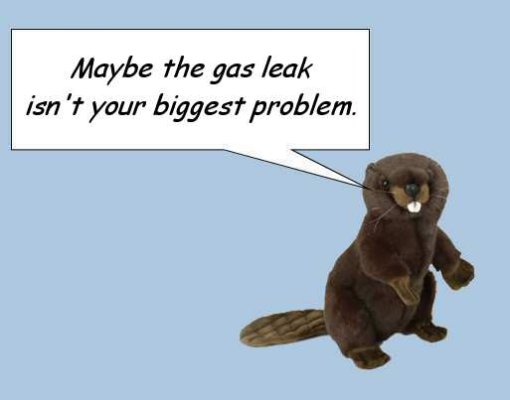thefed said:
You seem to have a reason why it wasnt natural gas...any ideas what it was?lol
I find it hard to believe that i could've felt super before i got there, worked in natural gas for a few hours, and left feeling sick...and the nat gas didnt have anything to do with it. it is possible though.
Yeah, most likely you were fighting a virus.
Natural Gas, as composed in THIS country, is not toxic. Other than rapid combustion, the only other thing NG can do is Oxygen occlusion, which I think someone already mentioned in this thread.
I have to ask... How could you
not know what NG "smells like"??!! I knew I guy once who didn't know. But he was born and raised in a grass hut in Matabeleland, now part of Zimbabwe. But he
did know what bottled cooking gas smelled like!

If you were subject to a very very high level of Ethyl Mercaptan, then some of the symptoms you had might match. But the level would be so high that I doubt you would stay there! EM is inserted into NG at a rate of 5 PPB, human sense is around .5 PPB for EM. That's parts per billion, not million.
A question to be worked out by the studious is: What would be the percentage of NG to air have to be to get the EM level up to OSHA limits for short-term exposure?
The explosive mixture of NG to air is 5 to 15 percent. Over 15% the mixture is too rich to ignite.
If by chance you
were over the STL for EM, then your liver will probably quit one day without warning. Best to write it out, and will your body to science

Italy lady: I don't know what Italy does for gas smell-wise. I would not automatically assume that it is the same as the US. It is probably something much superior to what us poor colonists do. Probably as reliable as a Fiat in the US.
Justin: Choice of NG or electric for cooking can be very regional, and even vary locally. About a 1/4 mile down the road, they don't have any gas lines, so electric everything. But I have gas, as do my neighbors. But sometime, I guess someone around here thought that an electric cooktop was "more stylish", so cooktops and wall ovens are electric. I prefer gas, myself, for the instant heating adjustment when cooking. An electric heating element has the thermal-lag effect, which makes cooking amateurs like me see-saw the heat control up and down!
No gas pipe to the kitchen area, and as these are all slab houses, I would have to run a gas pipe across the attic. That's no problem, it's the drop into the kitchen that is the problem. The range top is on an outside wall, no way to drop a pipe down from the attic due to roof intersecting. And I'm not going to rip cabinets, tile, backer board, etc. out to insert a pipe into the wall! I guess I'll just have to cook outside if I want to see flames.


